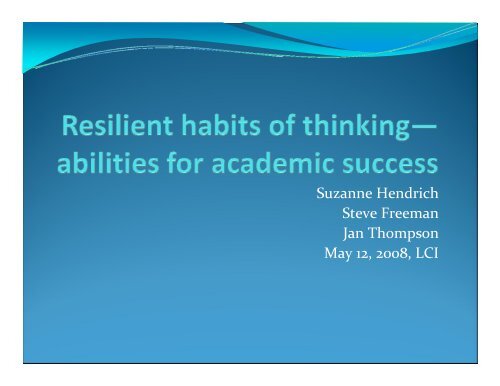Resilient Habits of Thinking - Learning Communities
Resilient Habits of Thinking - Learning Communities Resilient Habits of Thinking - Learning Communities
Suzanne HendrichSteve FreemanJan ThompsonMay 12, 2008, LCI
- Page 2 and 3: Outline• Background on resiliency
- Page 4 and 5: Resiliency abilities/habits• Auto
- Page 6 and 7: Defining/working with autonomy• W
- Page 8 and 9: Next stepsMiller Faculty Fellowship
Suzanne HendrichSteve FreemanJan ThompsonMay 12, 2008, LCI
Outline• Background on resiliency—what and why?• Resiliency self‐assessment and reflection• Defining habits <strong>of</strong> thinking that support resiliency• Take home messages/next steps
Resiliency: what and why• Resiliency: increased probability <strong>of</strong> school and lifesuccess despite adversities caused by …characteristics, conditions, and experiences.http://crede.berkeley.edu/tools/glossary.html• Ability to cope positively with set backs or adversitiesseems crucial—students experience all sorts <strong>of</strong>adversities as they pursue their education.• Our experience in the Academy for Leadership and<strong>Learning</strong> course (NREM 112x) has indicated thatstudents benefit from working on resiliency
Resiliency abilities/habits• Autonomy• Separation <strong>of</strong> identity from family/peers• Accepting responsibility• Sense <strong>of</strong> purpose• A higher/greater purpose, something beyond one’s self• <strong>Learning</strong> as opposed to meeting a requirement• Problem solving• Creative thinking, multiple approaches• Social competence• Appreciating diversity
Resiliency self assessment• Complete it• What insights occur to you as you reflect on this selfassessment?
Defining/working with autonomy• What does the habit <strong>of</strong> “autonomy”• Look like?• Sound like?• Feel like?• Examples <strong>of</strong> students who are/are not acting withautonomy• Story‐telling—what examples (in your life or the life<strong>of</strong> someone who has influenced you) illustrateautonomy?• Ideas to help someone develop autonomy?
Defining/working with sense <strong>of</strong>purpose• What does the habit <strong>of</strong> “sense <strong>of</strong> purpose”• Look like?• Sound like?• Feel like?• Examples <strong>of</strong> students who are/are not acting withsense <strong>of</strong> purpose• Story‐telling—what examples (in your life or the life<strong>of</strong> someone who has influenced you) illustrate sense<strong>of</strong> purpose?• Ideas to help someone develop sense <strong>of</strong> purpose?
Next stepsMiller Faculty Fellowship:Cultivating <strong>Resilient</strong> <strong>Habits</strong> <strong>of</strong>Mind: New Ways to Educate Leaders• Suzanne Hendrich, Pr<strong>of</strong>essor, Food Science and HumanNutrition• Barb Licklider, University Pr<strong>of</strong>essor,EducationalLeadership and Policy Studies• Jan Wiersema, Lecturer, Educational Leadership andPolicy Studies• Jan Thompson, Associate Pr<strong>of</strong>essor, Natural ResourceEcology and Management• Steven Jungst, Pr<strong>of</strong>essor, Natural Resource Ecology andManagement• Julie Blanchong, Assistant Pr<strong>of</strong>essor, Natural ResourceEcology and Management• Gail Nonnecke, University Pr<strong>of</strong>essor, Horticulture• Cindy Haynes, Associate Pr<strong>of</strong>essor, Horticulture• Alok Bhandari, Associate Pr<strong>of</strong>essor, Agricultural andBiosystems Engineering• Steve Freeman, Associate Pr<strong>of</strong>essor, Agricultural andBiosystems Engineering• Terri Boylston, Associate Pr<strong>of</strong>essor, Food Science andHuman Nutrition• Sorrel Brown, Lecturer, Agricultural Education andStudiesProject description:• faculty and student services staff team• meet biweekly (2 h/wk) 2008‐09• Will develop:• in‐class activities• sequenced lesson plans• self‐assessment and reflection toolsrelated to resiliency• learning assessment rubrics thatguide student learning <strong>of</strong> resilienthabits <strong>of</strong> thinking.• $1000 development funds perperson• participants in this project willcommit to incorporating theseproducts into their courses and intotheir work in advising and in <strong>Learning</strong><strong>Communities</strong>.
Next steps• If interested in our project• Project LEA/RN Introductory Workshop, led by BarbLicklider, W‐F, Aug 13‐15, 2008• Learn to apply learning theory to enhance interaction andstudent engagement in their learning• Interactive learning‐focused techniques• Cooperative learning strategies• Classroom learning assessment techniques• 2 person teams from a department or program areencouraged (learning partners)• Sign up list here or email shendric@iastate.edu



